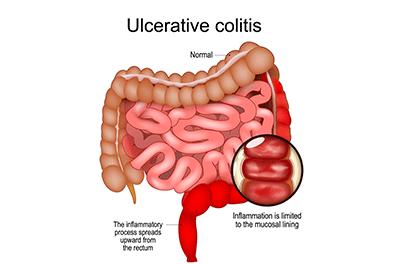Pediatric ulcerative colitis (UC)
Pediatric ulcerative colitis (UC) causes ulcers and inflammation in the inner lining of the child’s colon and rectum.
What is pediatric ulcerative colitis (UC)?

Ulcerative colitis (UC) is a type of inflammatory bowel disease (IBD), along with Crohn’s disease. UC causes tiny sores in the large intestine lining, which bleed and produce mucus and pus.
Ulcerative colitis is a chronic (reoccurring) condition. The symptoms and their severity can vary — often, children will experience periods of remission where their symptoms are gone.
UC often begins slowly, but eventually, becomes more severe.
What are the signs and symptoms of pediatric ulcerative colitis (UC)?
Abdominal pain or cramping
Bloody stools
Diarrhea with blood or pus
Fatigue
Fever
Intense cramping
Joint pain
Skin rash
Sudden urges to use the bathroom
Symptoms vary along with the severity of the disorder.
Problems related to UC extend beyond the GI tract, including:
Ophthalmic conditions
Joint pain
Hepatobiliary disease (of the liver, gall bladder and bile ducts)
What are the causes of pediatric ulcerative colitis (UC)?
Experts are not sure what causes ulcerative colitis. They think it might be caused by the immune system overreacting to normal bacteria in the digestive tract.
Ulcerative colitis is most likely to develop in children and young adults between the ages of 15 to 25; however, it can occur at any age. Having a family member with inflammatory bowel disease also increases the likelihood of getting UC.
How is pediatric ulcerative colitis (UC) treated?
Medical treatment
Medical treatment aims to contain and control intestinal inflammation, limit extra-intestinal involvement and make it possible for patients to lead as active and normal a life as possible.
Outpatient treatment includes the use of anti-inflammatory therapy. Corticosteroids are effective in subduing acute bouts of inflammation, but long-term steroid treatment is not advised due to its harmful side effects.
Conoloscopy
A pediatric colonoscopy includes a long, flexible, lighted tube (endoscope) allowing a gastroenterologist to examine a child's large and small bowel.
Surgery (proctocolectomy)
A minority of patients, between 5 and 10 percent, do not respond to medical therapy and will require surgery. Most ulcerative colitis patients undergo restorative proctocolectomy. This technique involves removing the colon and rectum, then constructing an ileoanal pouch (using your small bowel) to help you retain continence.
At Children’s Health, the most advanced techniques, such as minimally invasive procedures, are used to the remove the colon. These methods reduce pain and scaring.
Pediatric ulcerative colitis (UC) doctors and providers
 Adam Alder, MDPediatric Surgeon
Adam Alder, MDPediatric Surgeon Michele Alkalay, MDPediatric Gastroenterologist
Michele Alkalay, MDPediatric Gastroenterologist Natasha Corbitt, MDPediatric Surgeon
Natasha Corbitt, MDPediatric Surgeon Diana Diesen, MDPediatric Surgeon
Diana Diesen, MDPediatric Surgeon Barbara Gaines, MDPediatric Surgeon
Barbara Gaines, MDPediatric Surgeon Lauren Gillory, MDPediatric Surgeon
Lauren Gillory, MDPediatric Surgeon Bhaskar Gurram, MDPediatric Gastroenterologist
Bhaskar Gurram, MDPediatric Gastroenterologist Russell Hawkins, MDPediatric Surgeon
Russell Hawkins, MDPediatric Surgeon Charles Hong, MDPediatric Surgeon
Charles Hong, MDPediatric Surgeon Lauren Lazar, MDPediatric Gastroenterologist
Lauren Lazar, MDPediatric Gastroenterologist Stephen Megison, MDPediatric Surgeon
Stephen Megison, MDPediatric Surgeon Megha Mehta, MDPediatric Gastroenterologist
Megha Mehta, MDPediatric Gastroenterologist Carrie Moore, MDPediatric Surgeon
Carrie Moore, MDPediatric Surgeon Joseph Murphy, MDPediatric Surgeon
Joseph Murphy, MDPediatric Surgeon Samir Pandya, MDPediatric Surgeon
Samir Pandya, MDPediatric Surgeon Laura Purcell, MDPediatric Surgeon
Laura Purcell, MDPediatric Surgeon Faisal Qureshi, MDPediatric Surgeon
Faisal Qureshi, MDPediatric Surgeon Mhammad Gaith Semrin, MDPediatric Gastroenterologist
Mhammad Gaith Semrin, MDPediatric Gastroenterologist Luis Sifuentes-Dominguez, MDPediatric Gastroenterologist
Luis Sifuentes-Dominguez, MDPediatric Gastroenterologist